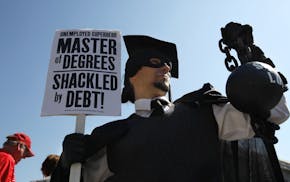Democrats and Republicans rarely agree on anything these days, especially when the conversation swings to taxes and the economy.
But it happened Thursday, when leaders from both parties and members of Gov. Mark Dayton's administration assembled in front of a St. Paul storefront and threw their support behind a bill that would require online retailers to collect a sales tax on all purchases made by Minnesota residents.
Similar calls have emanated from state capitols around the country. And in Washington, D.C., both parties are lining up behind a federal measure that would close a loophole that is perfectly legal, but patently unfair.
The loophole comes courtesy of a 1992 Supreme Court ruling involving the state of North Dakota and Quill Corp., an office products catalog merchant. The court said that because Quill did not have a substantial physical presence in North Dakota it could not be required to collect a sales tax on purchases made by North Dakota residents.
The ruling, which hinged on technical issues relating to interstate commerce, has been misappropriated by antitax zealots ever since.
The court never said, as some seem to believe, that online sales are exempt from taxes, or that efforts to impose or collect them are unconstitutional. Merchants of any ilk can be required to collect a sales tax as long as they have a store, warehouse, office or other physical presence in the state where the buyer of a product lives.
Target's and Best Buy's online customers pay a sales tax because the chains have a presence everywhere. Seattle-based Blue Nile, an online only jeweler, collects a sales tax on purchases made by its customers in Washington state. Ditto for Utah customers of Salt Lake City-based Overstock.com.
But elsewhere, including in Minnesota, online-only merchants like Amazon.com and eBay enjoy a price discount of 7 percent. This has helped give rise to the practice of "showrooming": Consumers visit the store to view the product, but go online to buy it.
Technically, Americans in states with sales taxes are supposed to keep track of out-of-state purchases and pony up the necessary sales tax on April 15. In Minnesota, the use tax is supposed to kick in when purchases exceed $770 a year.
Guess how well this self-reporting requirement works. In Minnesota, fewer than 800 people declared that they owed the state sales tax proceeds for purchases made in 2010.
A widely cited University of Tennessee study says states have lost more than $52 billion during the past six years due to untaxed Internet purchases. The same study, which was released a couple of years ago, projects that in Minnesota, total state and local sales and use tax revenue losses from e-commerce sales will likely exceed $261 million in 2012. Minnesota revenue officials estimate the state loses $149 million a year.
I doubt that the pot on the other side of the Internet rainbow is swelling with that much gold. The Tennessee study, in particular, seems a broad estimate based on gross retail sales in the state, which totaled more than $72 billion in 2010. Not all retail sales in Minnesota are taxable, though, and some products categories are fairly well insulated from online competition.
Like most states, though, Minnesota has neither the means nor the manpower to monitor the online purchases made by its residents. And before the Great Recession, state revenue officials probably didn't think it a priority.
But state coffers are bare, and online retail sales are growing at twice the rate of retail sales overall. According to the U.S. Department of Commerce, total retail e-commerce sales for 2011 were estimated at $194.3 billion.
Legislation in Minnesota, which is modeled after bills that have passed or are being actively considered by more than 20 states, would expand the definition of a retailer's physical presence, or "nexus," to include affiliate marketers: Minnesota residents or businesses whose websites include advertisements for Amazon.com and their online-only merchants.
The new definition would apply to affiliate marketers who receive more than $10,000 a year in commissions or referrals from an online merchant. Minnesota revenue officials estimate that it would boost state tax collections by only $5 million a year.
When this legislation first cropped up in other states, Amazon and other online retailers responded by "firing" all affiliates in those states and, it a least one case, filed a lawsuit to block or repeal the measure.
But Amazon, for one, has softened its stance in recent months. It will begin collecting sales taxes from customers in California beginning in September, and it has negotiated deals to do the same in other states where it operates warehouses but had resisted paying taxes.
In its most recent annual report the company noted that more than half its $34 billion in revenue "is already earned in jurisdictions where we collect sales tax or its equivalent." More important, the company has now thrown its weight behind federal legislation. It recognizes, correctly, that a uniform rate for all online merchants is better and more efficient than a patchwork quilt of local regulations.
Having online merchants collect a sales tax won't kill e-commerce. Consumers enjoy the friction-free benefits of online shopping too much to give it up. They like being able to research and purchase exactly what they want without having to get in their cars to do so.
Even with a sales tax, online-only merchants are likely to still have lower prices. Operating a Web storefront requires fewer employees, and warehouse space is much cheaper to own or rent than high-traffic retail space.
The difference shows up starkly in one metric, operating income per employee: Amazon's is more than three times Best Buy's. That explains why a price survey by one Wall Street analyst last year concluded that Amazon would still beat competitors' prices on identical items almost half the time, even with a sales tax tacked on.
Taxing all online sales won't end showrooming. But it will make it a fairer fight.
ericw@startribune.com • 612-673-1736

Wieffering: Time to get over debit card fees
For Thrivent and others, warnings were there

With billions in sales, some co-ops are big business

